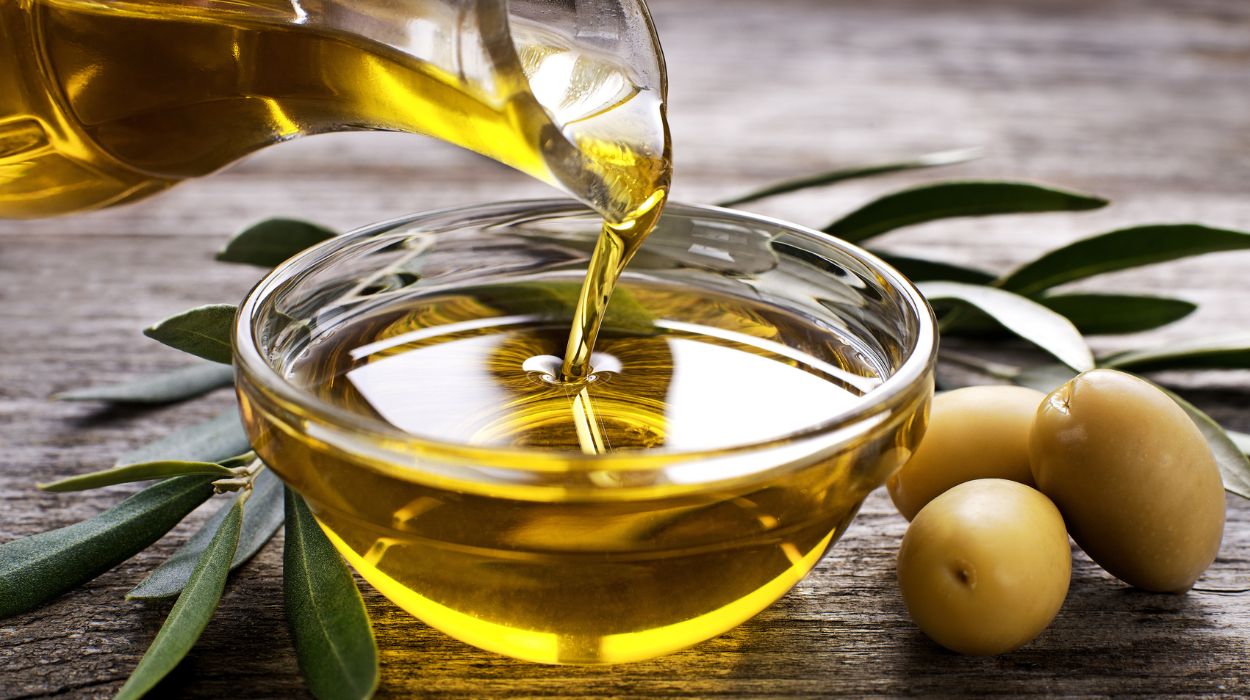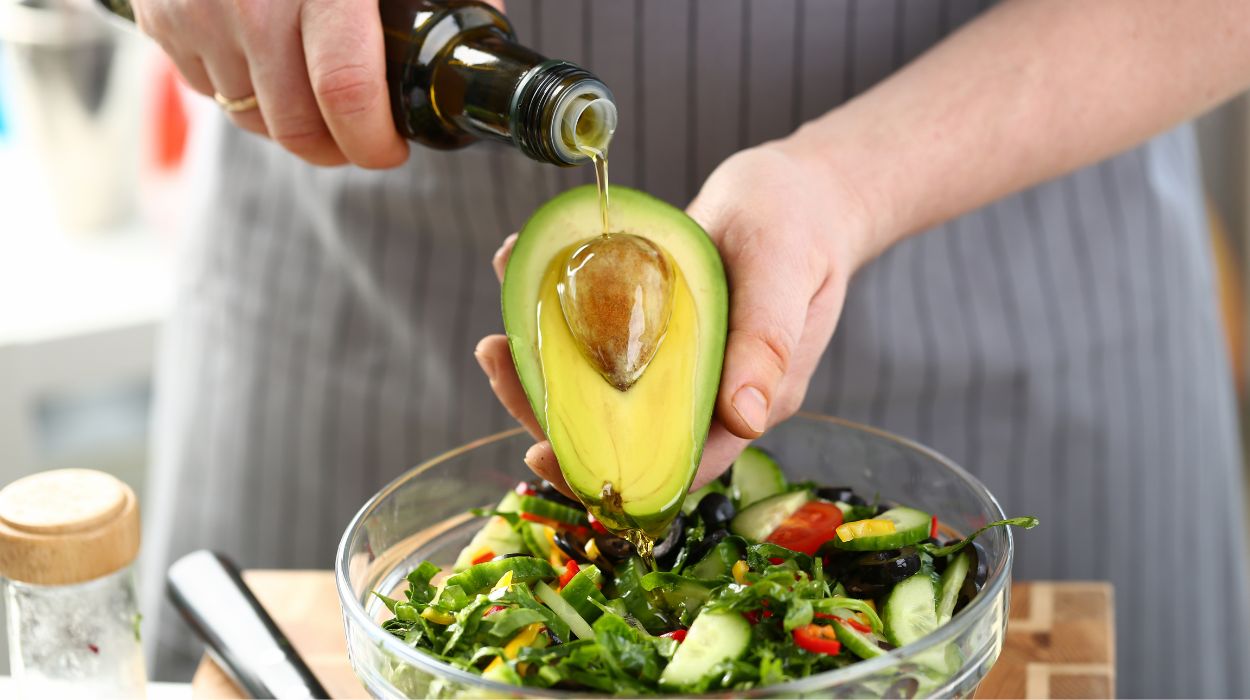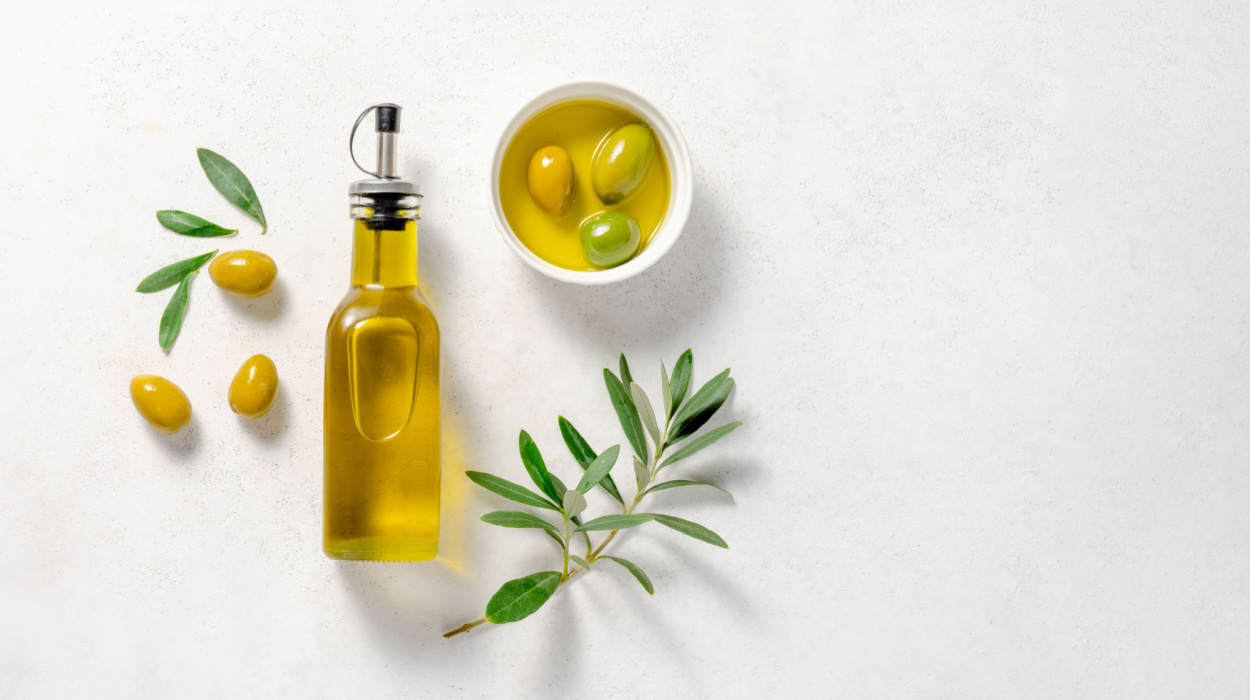Olive oil is a staple in the Mediterranean diet, an anti-inflammatory diet that emphasizes healthy fats. In fact, olive oil is the main fat source[1] in the Mediterranean diet and ranks highest in nutritional value[2] among other dietary fat sources. Olive oil is high in monounsaturated[3] fat, which reduces the risk of cardiovascular disease and may promote weight loss.
Olive oil is commonly used in cooking, on salads, as a dipping oil, or consumed as a shot. This article addresses how much olive oil per day to lose weight is optimal, and offers ways to consume olive oil for weight loss.
How Much Olive Oil Per Day To Lose Weight?
Specific dosage recommendations have not been established regarding olive oil for weight loss. Instead, general dietary guidelines break down olive oil recommendations[5] for overall health based on gender. Women should consume 1.5–2 tablespoons of olive oil a day, while men should consume 2–2.5 tablespoons of olive oil per day.
If you are consuming olive oil for weight loss, discuss your weight loss goals with a doctor or nutritionist. They will help you determine a daily recommended amount of olive oil that is safe and effective for you.
Olive Oil Benefits For Weight Loss

Olive oil has several health benefits that may contribute to weight loss.
Reduced Body Weight And Fat
Studies on monounsaturated fats, the type of fat found in olive oil, demonstrate a correlation between these fats and reduced body weight[3] and body fat. This is partially due to the anti-inflammatory effects of healthy fat; inflammation is correlated with weight gain.[6] Diets high in monounsaturated fat are so effective at reducing inflammation, they’re frequently used to treat inflammatory bowel diseases.[7]
Increased Satiety
Olive oil may also contribute to weight loss via its ability to decrease hunger.[8] Studies have shown that medium-chain triglycerides, a type of fat in olive oil, can help increase satiety. This can reduce snacking and excessive calorie intake.
Reduced BMI, Abdominal Fat And Waist Circumference
Along with overall body weight and body fat, some studies show that olive oil can reduce[9] BMI, abdominal fat, and waist circumference. These effects are attributed to olive oil’s anti-inflammatory and antioxidant properties. Polyphenols, compounds[10] found in many plant foods, provide many of olive oil’s weight loss and health benefits.
Improved Fat And Glucose Metabolism
Olive oil may improve fat and glucose metabolism.[11] Better fat metabolism can help lower LDL cholesterol and better glucose metabolism can help prevent diabetes. Improvements to both these functions support weight loss.
Reduced Disease Risk
Diets high in saturated fats can raise[12] cholesterol, whereas diets high in unsaturated or monounsaturated fat, which come from olive oil, can lower cholesterol. This reduces the risk of cardiovascular disease.[13]
Obesity is an important risk factor[14] for heart disease. Eating a healthy diet with healthy fat sources can improve cholesterol and heart function, which can support weight loss. If you have high cholesterol, consult a nutritionist to establish how much olive oil you should consume per day to lower your cholesterol.
Olive oil also increases bacterial diversity in the gut microbiome.[15] Bacterial diversity is essential for producing short-chain fatty acids and helping prevent disease.
How To Use Olive Oil For Weight Loss

Olive oil can be consumed in numerous ways for weight loss.
Use As A Salad Dressing
Drizzle olive oil over salads and enjoy! Alternatively, use olive oil as a base and add other ingredients to it, such as lemon juice, vinegar, mustard, salt, pepper, and other spices. If you add honey to the dressing, use a small amount to keep the carbohydrate count low.
Use As A Dip
Pour olive oil into a bowl and dip your bread and vegetables in it. You can dip food into olive oil as a snack, side dish, or appetizer.
Cook With Olive Oil
Use olive oil to grease pans for baking and sauteeing foods. When using olive oil for cooking, cook at lower temperatures. For higher-temperature cooking, choose an oil with a higher smoke point, such as avocado oil.[16]
Mix Olive Oil Into Grains
Add a savory taste to your grains. To moisten grains like rice, quinoa, and oats, cook the grains then add a drizzle of olive oil and mix well. Season as desired.
Add To Smoothies
Obtain the nutritional and weight loss benefits of olive oil by adding a little to your smoothie. If you include a variety of fruits and vegetables in your smoothie, the taste of the fruits and vegetables will overpower the olive oil.
To achieve and maintain a healthy weight, you can also add olive oil to other beverages such as coffee or tea.
Drink Olive Oil
Some people prefer to consume olive oil alone instead of as a dip, dressing, or cooking oil. The taste may take some getting used to. Many people experience health benefits by consuming a shot of plain olive oil before breakfast.
How Much Olive Oil Per Day Is Too Much
Olive oil has many nutrients[17] and offers potential weight loss benefits. In fact, many experts suggest consuming olive oil[18] over any other fat source. However, you should not overconsume it.
For some, a tablespoon of olive oil a day is enough for weight loss. For others, they may find two tablespoons more effective.
Adhere to the dietary recommendations which suggest[5] no more than 2 tablespoons of olive oil per day for women and no more than 2.5 tablespoons for men. If you want to consume more olive oil, ask your doctor or nutritionist for guidance. They can advise you on how much olive oil per day is healthy for you.
Other Oils For Weight Loss
Explore different oils for weight loss based on their monounsaturated fat content and nutritional value.
- Avocado oil: Avocado oil is almost 70% monounsaturated fat.[16] It also contains antioxidants, including vitamin E.
- Almond oil: Almond oil contains mostly monounsaturated and polyunsaturated fats, making this a healthy option. Almond oil is also a good source of polyphenols and antioxidants,[19] which provide additional health benefits.
- Sesame oil: Sesame oil is another great source[17] of monounsaturated and polyunsaturated fats. Sesame oil is great for cooking but can also be drizzled on foods after it has been cooked.
- Coconut oil: Coconut oil may be another good option for some. While coconut oil is about 90% saturated fat, the chemical structure differs from animal saturated fat. Coconut oil does not have the same potentially harmful effects as saturated fat that comes from animals.[20] Consult a doctor to determine if coconut oil is suitable for you.
Conclusion
Health experts prefer olive oil to any other healthy fat because of its robust nutritional profile and its ability to influence weight loss. Olive oil may support a healthy weight via its anti-inflammatory and antioxidant properties, as well as its satiating effects.
Add olive oil to salads, smoothies, or grains, or use it as a dip for vegetables. While there’s no established daily amount of olive oil that is recommended for weight loss, it’s advised to stick to general dietary recommendations. Consult your doctor to establish if olive oil is right for you, and to determine an exact daily amount to consume.
Frequently Asked Questions
Yes. Some studies have linked olive oil with reduced body fat, waist circumference, and abdominal fat distribution.
You can, but it is not necessary. No evidence suggests a need to drink water after consuming olive oil. This is a matter of preference.
Either is fine. Some people prefer to drink olive oil in the morning on an empty stomach. However, there is no evidence to suggest that this is the best time to drink it.
Possibly. While there is little evidence to suggest that olive oil speeds up general metabolism, studies show that it can improve fat and glucose metabolism.
Overconsuming olive oil could have potential side effects such as gastrointestinal upset or allergic reaction, for those who are allergic to olives.
Olive oil can be consumed in numerous ways to achieve its health benefits. These include using olive oil in salad dressing, putting olive oil in your smoothies, adding olive oil to grains, and drinking plain olive oil.
Not necessarily. Avocado oil is nutritious and a good source of monounsaturated fat. It also has a higher smoke point than olive oil, making it safer for cooking. However, experts feel olive oil is the healthiest type of oil.
Olive oil is one of the best healthy fats. It has anti-inflammatory properties, positively influences the gut microbiome, can help reduce cholesterol, and can protect against heart disease.
 Evidence Based
Evidence Based
